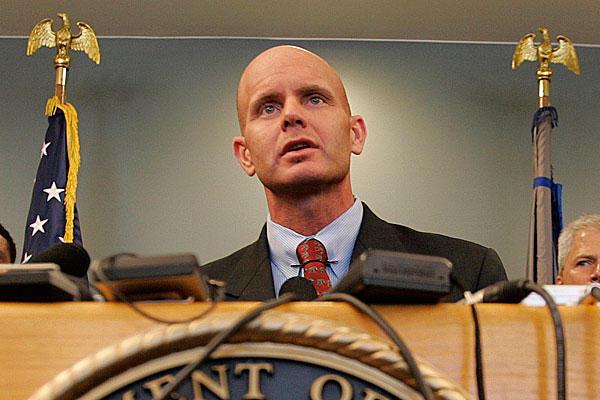
FBI agent Frederick W. Humphries
By Alan Bean
Civil libertarians are expressing grave concerns about central aspects of the unfolding scandal involving General David Petraeus. In particular, the role of FBI agent Frederick Humphries is raising eyebrows.
Consider this excerpt from a recent piece in the New York Times:
By all accounts, Mr. Humphries doggedly pursued Ms. Kelley’s cyberstalking complaint. Though he was not assigned to the case, he was admonished by supervisors who thought he was trying to improperly insert himself into the investigation.
In late October, fearing that the case was being stalled for political reasons, Mr. Humphries contacted Representative Dave Reichert, a Republican from Washington State, where the F.B.I. agent had worked previously, to inform him of the case. Mr. Reichert put him in touch with the House majority leader, Eric Cantor, who passed the message to Mr. Mueller.
Here we have a rouge agent going above the heads of his superiors to pursue an unauthorized investigation. Then, without authorization, Humphries contacts his friends in Republican politics who can be counted on to take the matter directly to the Big Cheese, FBI Director Robert Mueller.
Agent Humphries, it seems, was acting as a friend of Jill Kelley, not in his official capacity. Kelley has been described as a “Tampa socialite”, whatever that means. Like Petraeus biographer Paula Broadwell, Kelley appears to be an attractive woman who collected prominent men the way some women collect tea pots.
If Humphries was concerned about the content of the emails Kelley showed him, his responsibility was to refer the matter to the appropriate authorities and get out of the way. That’s not what happened. We can only be glad that Eric Cantor didn’t attempt to politicize this story prior to the election which, it seems, was Humphries’ hope and expectation.
But the concern goes deeper than that. Much deeper. If the email correspondence of the CIA Director can be hacked without his knowledge, none of us are safe.
I am not suggesting that Paula Broadwell’s reckless email correspondence with Ms. Kelley should have been ignored; but the issue shouldn’t have played out in the media until all the relevant facts had been ascertained. Reporters were bound to sensationalize the story, and the gradual leaking of lurid details brought out the media’s most puerile tendencies.
But here’s the thing, can any overly zealous FBI agent access my private emails simply by asking the good folks at Google for a look-see? Apparently so. The right to privacy has died the death of a thousand qualifications since 9-11 and the Petraeus case simply illustrates how profound the erosion has been.
It is impossible to evaluate the claim that Paula Broadwell was in possession of “classified documents” since even documents of minor importance carry top secret status these days. When the full truth comes out, I doubt we will find a broach of national security.
A reckless and ill-considered foreign policy threatens American national security far more than the tragically silly missteps of a star-crossed biographer. When a compulsive panic over national security trumps the basic freedoms that define our nation at it’s best, something precious has been lost.
Many of the cases Friends of Justice has covered over the years involve irresponsible FBI agents. Take Rodney Hayes, the rookie FBI agent who repeatedly lied to an Arkansas grand jury about Alvin Clay’s involvement in a real estate scam. We are currently investigating a bizarre case in which an FBI agent mistakenly concluded that a black-run software company was nothing more than a fraudulent attempt to find work for the members of a Colorado Springs church. When a grand jury refused to swallow these claims, the feds downgraded their claims and plowed ahead. (More on that later.)
The horrible abuses of civil rights that characterized the J. Edgar Hoover years are gradually returning to America. We operate on the untenable assumption that every day, in every way our society is evolving toward perfection. The truth is much more complex. In some respects, we have made great strides; but in others, we are rapidly losing ground. There is nothing inevitable about the emergence of a just society; we must work for justice, and the moment we stop working, we begin losing ground. The Petraeus case suggests that, on the issue of privacy rights front, we have stopped working.
